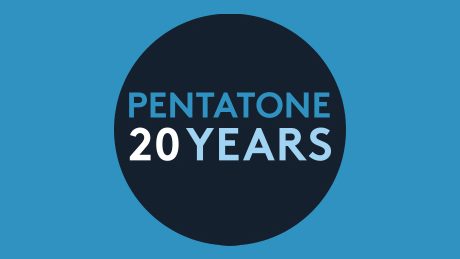| In September 2021, the multi-award winning classical music label PENTATONE celebrates its 20-years anniversary. This article traces the label’s history, illustrated by means of picking 20 albums of the year that bear witness to PENTATONE’s multifarious artistic output and dynamic development through the years. The year 1999 was a landslide in the history of music consumption with the launch of the free music sharing website Napster and other similar services in its wake, which accelerated the dissemination of music but put rightsholders offside completely. The primacy of the compact disc and the extensive revenue it had brought artists, labels and sellers since its introduction in the early 1980s was suddenly under threat. Even if the effects of free music sharing were first felt mainly in popular genres, it potentially endangered classical music in the long term too. Luckily, 1999 also brought promising developments, such as the introduction of the Super Audio CD, which captured recorded sound in surround and in higher resolutions than standard CDs could offer. Together with Sony, Philips had played a prominent role in the launch of the new audio format, and when Philips Classics merged into the Universal Music Group under the banner of Decca, three of its former executives decided to found a new label, dedicated to offering classical music in surround and building out a catalogue of SACD recordings. They named the label PENTATONE, the Greek word “Penta” referring to the five channels of surround recording. In 2002, PENTATONE’s first official release year, recordings by the Netherlands Philharmonic Orchestra and Concertgebouw Chamber Orchestra were launched, alongside remastered surround versions of legendary quadrophonic recordings from the 1970s, a branch that remained prominent within the label’s output until recently. But the big bang that truly catapulted PENTATONE’s visibility was an album containing Music from the Royal Wedding of Dutch crown-prince Willem-Alexander and princess Máxima. The album’s ultimate showstopper was bandoneonist Carel Kraayenhof’s heart-wrenching interpretation of Piazzolla’s Adios nonino, which moved the Argentinian princess to tears. The album went triple platinum on the Dutch market, an unparalleled success. After the Netherlands had been conquered, PENTATONE raised the bar to a global level with a release of Prokofiev’s Peter and the Wolf and Beintus’s Wolf Tracks, performed by the Russian National Orchestra under the baton of Kent Nagano. A unique aspect of this project was the participation of world leaders Bill Clinton and Mikhail Gorbachev, as well as world-famous actress Sofia Loren. The recording, which can be seen as a sign of American-Russian rapprochement after decades of Cold War animosity, was awarded a Grammy in 2003. 2004 marks the beginning of the long-lasting collaboration with Julia Fischer. The young star violinist signed an exclusive contract to PENTATONE and the first three albums she recorded all turned into references that still enjoy great popularity today. Between recording Russian Violin Concertos (Khachaturian, Prokofiev & Glazunov, 2004) and Tchaikovsky’s Violin Concerto (2006) with the Russian National Orchestra and Yakov Kreizberg, Fischer went back to the source with a complete recording of Bach’s Sonatas and Partitas (2005). These three iconic releases would also become the first albums PENTATONE released on vinyl between 2017 and 2019. Besides the focus on solo instrumental and concerto music, PENTATONE traditionally has always made orchestral and symphonic music a focal point, as a genre in which the added value of recording in high resolution and surround is arguably the highest. Between 2007 and 2014, the label ventured complete recordings of the symphonies of Beethoven (2007-2011, with the Royal Flemish Philharmonic and Philippe Herreweghe), Bruckner (2008-2013, with the Orchestre de la Suisse Romande and Marek Janowski) and Tchaikovsky (2011-2014, with the Russian National Orchestra and Mikhail Pletnev). The first release of these was a critically-acclaimed recording of Beethoven’s legendary Fifth and light-versed Eighth Symphony, which deserves the title of album of 2007. Throughout its history, PENTATONE has maintained close ties to contemporary American composers and their most outstanding interpreters. The album of 2008, And If the Song Be Worth a Smile, offers songs by William Bolcom, Gordon Getty, Jake Heggie, David Garner, John Corigliano and Luna Pearl Woolf, many of whom have become habitues at the label in later years, with Corigliano’s multi-Grammy winning opera The Ghost of Versailles (2016) as an absolute highlight. The pieces on And If the Song Be Worth a Smile are performed by Susanne Mentzer, Kristin Pankonin, Lisa Delan and Matt Haimovitz. The latter two artists have contributed substantially to PENTATONE’s catalogue in later years. After her extraordinary triptych of albums, Julia Fischer expanded her PENTATONE discography with several successful releases, of which her complete Mozart violin concertos and Schubert works for violin and piano together with Martin Helmchen are likely the most noteworthy. In 2009, PENTATONE welcomed Arabella Steinbacher, one of the most outstanding violinists of her generation. Her debut album featured Dvořák’s famous Violin Concerto and Romance in F Minor alongside the less well-known but equally enchanting 1st Violin Concerto of Karol Szymanowski. With this album of 2009, it was immediately clear that PENTATONE had struck gold, and many more successes would follow. With nearly 50 PENTATONE recordings under his belt, and still going strong, maestro Marek Janowski certainly deserves mention among the label’s longstanding and loyal partners. Although his PENTATONE discography demonstrates his stylistic versatility, his command of German nineteenth-century repertoire is unsurpassed. In 2010, his interpretation of Brahms’s Ein deutsches Requiem with Camilla Tiling, Detlef Roth, the Rundfunk-Sinfonieorchester Berlin and the Rundfunkchor Berlin was praised by Gramophone for its “drama” and “immediate impact”, and it seems appropriate to single it out as album of 2010. Janowski’s tremendous significance for the label is underlined by the fact that he participated in the selected albums of the year from 2009 straight until 2011. For the latter year, we have chosen Wagner’s Der fliegende Holländer, performed by Janowski, the Rundfunk-Sinfonieorchester Berlin, Rundfunkchor Berlin and a cast of outstanding soloists. This release kickstarted a project that was epic in scope. 10 years after founding their own label, the three Flying Dutchmen now aimed at nothing less than a complete recording of Wagner’s 10 mature operas in the runup to the composer’s 2013 bicentenary, a total of 32 hours of music, released physically on 32 discs. Capturing a generation of the most important Wagnerian voices in premium sound, the recordings are still in demand years after the project’s completion. Amidst the Wagner celebrations, the untimely demise of conductor Yakov Kreizberg in 2011 was a saddening dissonance. Kreizberg left his mark on the first 10 years of PENTATONE with several well-received recordings. Besides his congenial artistic relationship with Julia Fischer, the maestro also impressed in symphonic repertoire, performed with the Netherlands Philharmonic, the Russian National Orchestra and the Wiener Symphoniker. PENTATONE commemorated the loss of this excellent musician with an In Memoriam double album, compiling his finest recordings for the label. This tribute, containing works by Dvořák, Wagner, Debussy, Johan Strauss Jr. amongst others, is the album of 2012. PENTATONE’s strong relationship with American composers has already been mentioned, and the album of 2013 is a fruit of the label’s prolific collaboration with Jake Heggie. Heggie is one of the most sought-after US composers for the voice, and his socially committed works often revolve around outstanding women, sung by outstanding female singers. The album Here/After documents his longstanding partnership with mezzo-soprano star Joyce DiDonato, in a song cycle about the troubled life of the French female sculptor Camille Claudel. 2013 was an important year within the development of PENTATONE, with a new management team joining the company with the goal to innovate the label towards the digital era of music. The thorough rebranding of PENTATONE’s house style was one of its first feats of arms. In 2014, this rebranding was implemented in several luxurious boxset releases, such as the earlier mentioned complete Bruckner and Tchaikovsky symphonies, as well as Mari Kodama’s complete Beethoven Piano Sonatas recordings. The old Remastered Quadrophonic Recordings series was revamped into a Remastered Classics Series, with eye-catching cover images of flowers and birds. Besides all these rebranding activities, Arabella Steinbacher’s recording of Mozart’s Violin Concertos 3-5 together with the Festival Strings Lucerne was the most significant new release of 2014, and therefore the album of the year. It is a nice coincidence that the sequel to this album, containing the remainder of Mozart’s violin concertos, will appear around the time of the label’s 20th anniversary. In 2015, PENTATONE released Shostakovich’s Seventh Symphony as part of its Shostakovich symphonies cycle together with the Russian National Orchestra and a host of renowned conductors, including Mikhail Pletnev, Vladimir Jurowski, Yakov Kreizberg and many others. This time, the orchestra performed under the baton of Paavo Järvi, and after having received rave reviews for several months, the album eventually received a Grammy Award for Best Surround Sound Album. The album of 2016 also bears testimony to PENTATONE’s strong inclination to Russian music, although the repertoire is quite different. Mari and Momo Kodama’s interpretation of Tchaikovsky Ballet Suites for four hands, with the sisters shining in stunning red dresses on the album cover, turned out to be an absolute hit. The Kodamas would return to PENTATONE for an even more layered sister act recording Martinů together with the Nemtanu sisters in 2018, and Mari Kodama’s affiliation to the label has been close throughout the 20 years of its existence. Another longstanding artist of the label is cellist Johannes Moser, whose 2017 recording of Elgar’s elegiac cello concerto and Tchaikovsky’s elegant Roccoco Variations, together with the Orchestre de la Suisse Romande and Andrew Manze, swept away critics and listeners alike. Although several of his PENTATONE albums have been awarded, this one holds a special place in the label’s catalogue, and deserves to be the album of 2017. In 2018, PENTATONE launched its exclusive collaboration with Pierre-Laurent Aimard, one of the most eminent pianists of our time with an unsurpassed command of twentieth-century repertoire. Aimard had a profound desire to make an integral recording of Olivier Messiaen’s Catalogue d’Oiseaux, one of modern music’s most striking and original works, in which the composer creatively translates his field recordings of birds into magical piano sounds. The unique aspects of this recording project had to be matched in the album’s overall presentation, and the label approached the release as a Gesamtkunstwerk. On top of an extensive booklet including Messiaen’s original analytical descriptions, the 3-CD boxset also contained a DVD with an animating and illuminating introduction of the works by Aimard himself behind the piano. As the icing on the cake, bird feathers, collected in the same region of Northern France where Messiaen made his field recordings, were added to the clamshell box. The project was met with great acclaim, and many view Aimard’s interpretation as an absolute reference. The album of 2019 is mezzo-soprano Magdalena Kožená’s baroque album Il giardino dei sospiri, together with Collegium 1704 and Václav Luks. Initially conceived as a scenic project, Kožená presents scenes from secular cantatas on tragic love by composers such as Handel, Leo, Marcello and Gasparini. In the same year, Kožená also released Soirée, a variegated song programme in chamber-musical setting amongst friends, with Sir Simon Rattle making his recording debut as a pianist. Kožená’s move to the label was yet another instance of a renowned artist with a vast major-label discography who chose to embark on an exclusive collaboration with PENTATONE. It underlines the growing reputation of the label in recent years, which was further acknowledged by PENTATONE winning Label of the Year Awards by Gramophone in 2019 and ICMA in 2020. Winning is also the subject of Puccini’s world-famous aria ‘Nessun Dorma’, which inspired the title of Piotr Beczala’s first PENTATONE debut album Vincerò!. This collection of Verismo arias by Puccini, Mascagni, Giordano and Cilea, performed together with the Orquestra de la Comunitat Valenciana and Marco Boemi, turned out to be a winner indeed. It has not only proven to be one of the bestselling albums of recent years, but has also enjoyed a warm critical reception. With Beczala currently reaching the golden years of his carefully planned career, more iconic recordings can be expected in the coming years. While Vincerò! stood out in many ways, one must admit that picking an album of the year is becoming ever more difficult in recent years, with so many exceptional releases and a release planning that is more stylistically diverse than ever before. It feels justified, therefore, to mention Alisa Weilerstein’s integral recording of Bach’s Cello Suites as a worthy contender for the title of album of 2020. While we have recently seen many established artists moving to PENTATONE from a major-label background, the label is also actively scouting young talent and innovative ensembles and artists. One of the most exciting rising stars of our times is guitarist Sean Shibe, whose PENTATONE debut album Camino is singled out as album of 2021. Camino is an introspective programme, exploring French-Spanish musical borders. We look forward to accompanying Shibe on his future musical journeys, which doubtlessly will lead to interesting, unexpected destinations. Together with Shibe and other talented artists and ensembles, we look forward to a third decade in the label’s history, in which we will continue to engage the most interesting artists for the most significant recordings, will continue to realise classical music’s transition into the digital age, and to secure a bright future for this unique form of human artistic expression. Written by Kasper van Kooten, PENTATONE’s Product Manager September 2021 |

September 17, 2021


